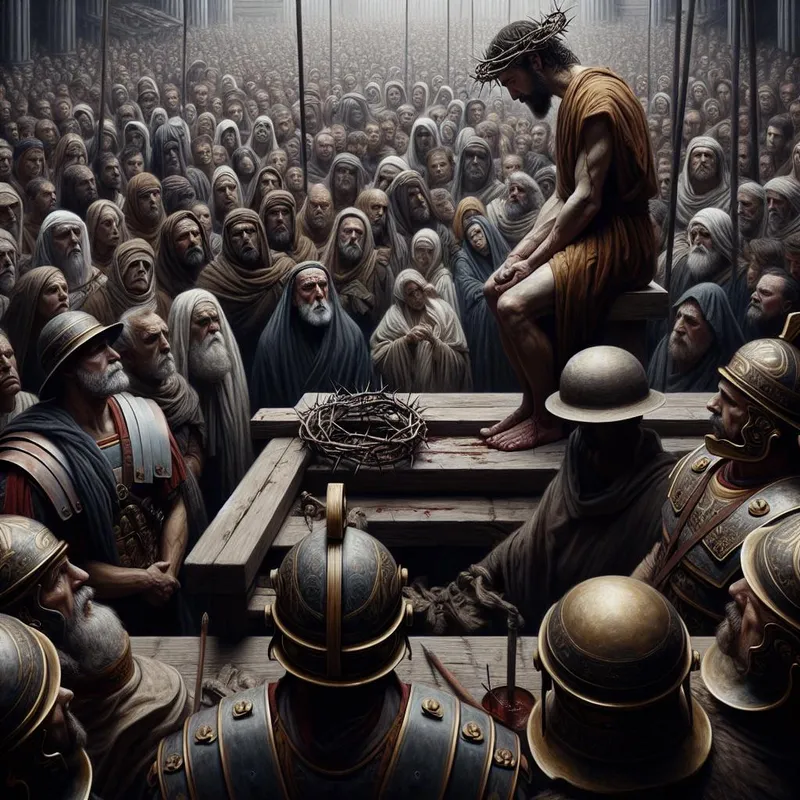
'Understanding the Responsible Christ Death: A Revealing Perspective for Believers'
Posted on 23 April 2024
Responsible for Christ's Death
The responsibility for Jesus' death can be attributed to several parties, as outlined in the Bible. The religious leaders of Israel played a significant role in plotting and orchestrating Jesus' arrest and execution. In Matthew 26:3–4, it is mentioned that the chief priests and elders of the people gathered in the palace of the high priest, Caiaphas, and conspired to secretly arrest Jesus and have Him killed. They were threatened by His signs and wonders, which posed a challenge to their authority in the religious society they dominated (John 11:47–50). Therefore, they plotted to take His life (John 11:53).
Although it was the Romans who physically crucified Jesus, it was at the insistence of the Jewish leaders. The Jewish leaders demanded that Jesus be put to death when He stood trial before Pilate (Matthew 27:22–25). The Romans, under the authority of Pontius Pilate, carried out the crucifixion. Roman soldiers drove nails into Jesus' hands and feet, erected the cross, and a Roman soldier pierced His side (Matthew 27:27–35).
Furthermore, the people of Israel also played a role in Jesus' death. They shouted "Crucify him! Crucify him!" when Jesus stood trial before Pilate (Luke 23:21). They even chose to have Barabbas, a thief, released instead of Jesus (Matthew 27:21). Peter confirmed this complicity of Israel in Acts 2:22–23 when he addressed the men of Israel, stating that they put Jesus to death by nailing Him to the cross with the help of wicked men. Therefore, it can be seen that Jesus' murder was a conspiracy involving various parties such as Rome, Herod, the Jewish leaders, and the people of Israel.
It is important to note that while God did not literally kill Jesus, He allowed Him to be put to death by the hands of the Jews and Romans. Acts 2:23 emphasizes God's sovereign knowledge in allowing people to unlawfully murder His Son as part of His deliberate plan and foreknowledge. However, God did not allow death to have the final say. He raised Jesus from the dead, freeing Him from the agony of death because it was impossible for death to hold Him (Acts 2:24). This highlights that Christ's death and resurrection were part of God's perfect plan to redeem all who believe in Him. As 2 Corinthians 5:21 states, "God made him who had no sin to be sin for us so that in him we might become the righteousness of God." Jesus' sacrificial death on the cross provides salvation for all who put their faith in Him.
Why This Matters
Understanding the responsibility for Jesus' death is crucial in grasping the significance of His sacrifice and the redemption He offers to humanity. Recognizing that it was a collective effort involving religious leaders, the Roman authorities, and even the people of Israel helps us comprehend the magnitude of Jesus' love for us. Despite being innocent, He willingly submitted Himself to unjust treatment and death because of His deep desire to save humanity from sin and reconcile us with God. It is through His death and resurrection that we can receive forgiveness and eternal life.
Think About It
Consider how Jesus' sacrificial death demonstrates the extent of God's love for you personally. Reflect on the responsibility each party had in Jesus' crucifixion and consider how this impacts your understanding of human sinfulness and our need for a Savior. How does knowing that God allowed Jesus' death as part of His divine plan affect your perception of His sovereignty and purpose in your life? Take time to thank Jesus for His sacrifice and reflect on how His death has brought about salvation and reconciliation for all who believe in Him.
